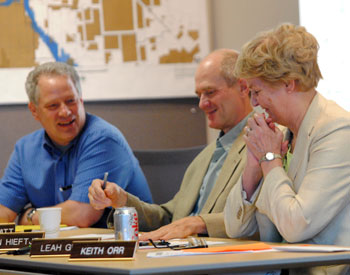Photos: Shorter Routine Also Ordinary
Most Saturday mornings at 7:30 a.m., some runners who call themselves the Nasty Boys Glee Club will gather near the corner of Cambridge Road and Washtenaw Avenue in Ann Arbor. The place is the very center of Ann Arbor – as defined by the Google Maps push pin for Ann Arbor. It’s known as “the benches” in NB circles – for the sit-able amenities in Douglas Park. From there, the Nasty Boys will head off on a route and pace determined by mutual assent, but generally guided by NB member Tom Bourque.

The view is to the south along the west side of Washtenaw Avenue. Nasty Boys Glee Club runners arrive at "the benches." Left in the frame (dark shorts, gray Ann Arbor Track Club T-shirt) is Mitch Garner. To his left is his former classmate, and a special guest on the run.
Bourque has maintained running logs for decades, including all of the Nasty Boys runs, which began in late 1996. Those logs reflect that for a year or maybe two, sometime around 2006-07, I joined them on several of their weekly Saturday morning runs. There’s also a Tuesday morning edition of the Nasty Boys run, but I never ran on a Tuesday.
While the Nasty Boys are a club, their membership seems fluid and flexible – non-regular runners who appear on Saturdays as friends, colleagues, or acquaintances of current members are welcomed to run along with the group, without a lot of hazing.
That held true on this Saturday morning – June 4, 2011 – when a former classmate of Nasty Boy Mitch Garner tagged along for the run.
Garner is known among the Nasty Boys as the “Iron Bulldog” – partly because Garner is a Yale University grad, and partly because he’s known as tough and tenacious himself. On Saturday, Bourque deferred to Garner on selection of the route – given that Garner had brought a guest.
So the group of a dozen or so runners headed west through the Burns Park neighborhood on a course for the University of Michigan athletic campus, completed a ceremonial lap around the track at Ferry Field, skirted the Crisler Arena renovations, crossed the East Stadium bridge, and then dove back into Burns Park. They wound up at Garner’s house, where he was serving brunch.
A group brunch is not part of the Nasty Boys Saturday morning routine. But when the men’s marathon gold medalist at the 1972 Olympic games joins you for a run, a break from the usual routine seems warranted. And that’s who Gardner’s guest was – Frank Shorter.
Shorter is in town to participate in this year’s 38th edition of the Dexter-Ann Arbor Run, hosted by the Ann Arbor Track Club. The Sunday, June 5 event includes 5K, 10K and half-marathon distances.
Celebrating the extraordinary is easy. Celebrating the routine and the ordinary – which is most of life – is more difficult. So I was envious of the Nasty Boys on Saturday, because I was not able to run alongside a legend like Frank Shorter. But I was also envious of Frank, because I was not able to join the Nasty Boys in their routine, regular run.
I did take some photos. [Full Story]






